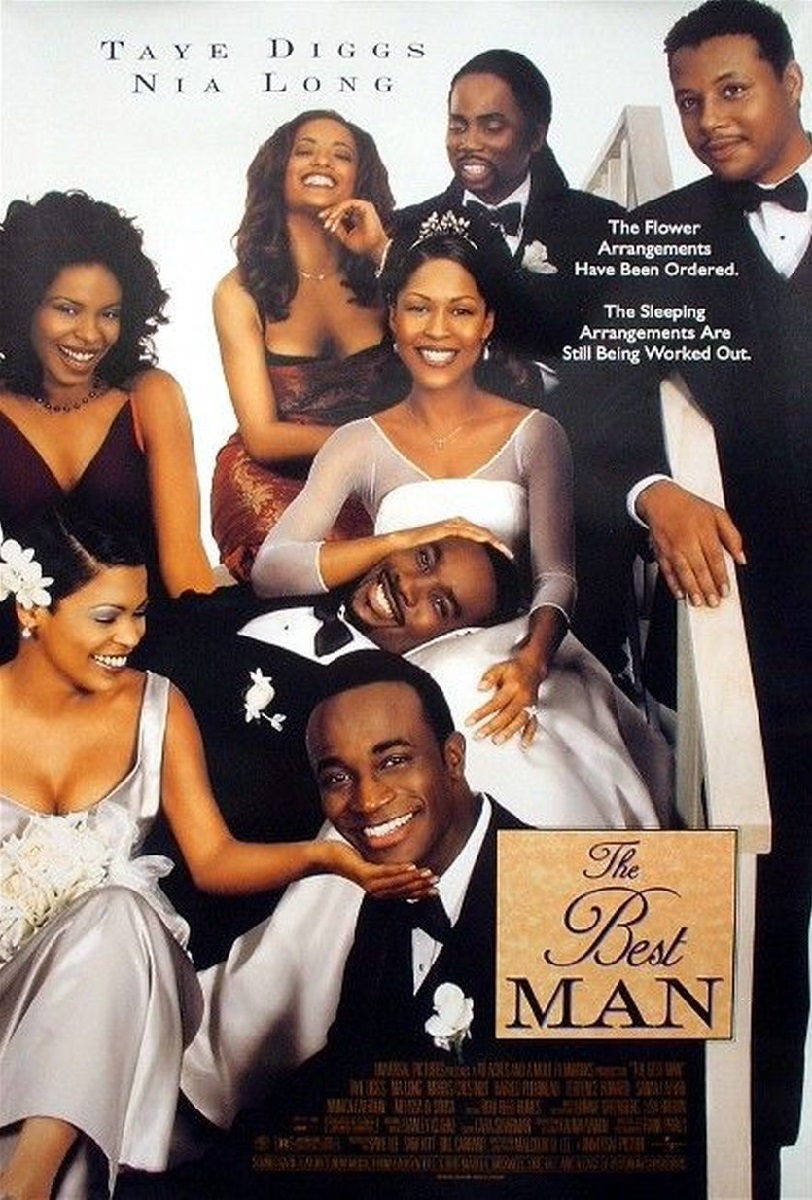The Best Man
Emanuel Levy, Variety, September 5, 1999
Well-mounted and engaging, “The Best Man,” Malcolm D. Lee’s impressive feature debut as writer and director, represents an honorable addition to the reunion genre, still defined by John Sayles’ “Return of the Secaucus Seven” and Lawrence Kasdan’s “The Big Chill.” This seriocomic film centers on the tangled web of relationships among a clique of upwardly mobile, career-oriented black friends and should play well with black viewers. But Universal faces the challenge of generating crossover appeal for a story that has no white characters; with the exception of “Waiting to Exhale,” most black romantic comedies have not been particularly successful at the B.O.
Taye Diggs, who was Angela Bassett’s romantic interest in “How Stella Got Her Groove Back,” here has a career-making role. His enormously appealing performance is reminiscent of the young Sidney Poitier in its dignity, but also registers an overtly erotic charge that Poitier, due to the restrictions of his times, was never encouraged to develop.
Diggs plays Harper Stewart, a handsome, ambitious writer whose first novel, “Unfinished Business,” is about to be published. In the first reel, Harper leaves behind Robin (Sanaa Lathan), his sensitive new girlfriend, and heads to New York to meet his old buddies and be best man in the wedding of his pal Lance Sullivan (Morris Chestnut), a superstar athlete, and the beautiful Mia (Monica Calhoun).
Initial encounter is with Jordan (Nia Long), an aggressive, career-driven TV producer who was Harper’s college roommate, and who one night almost went to bed with him. This missed opportunity serves as a central narrative thread, heightening tension over whether they’ll seize their last chance to consummate their passion.
As scripter, Lee finds interesting ways to introduce his protagonists: Quentin (Terrence Howard), a guitar-playing womanizer who gets to deliver the most cynical lines; Murch (Harold Perrineau), the polite gentleman who’s too nice for his own good, particularly when socializing with his domineering g.f., Shelby (Melissa De Sousa); and Candy (Regina Hall), a stripper who unexpectedly discloses a poetic streak and changes Murch’s life.
Like most reunion films, “The Best Man” deals with coming of age, specifically how young adults are forced to embrace the responsibilities of adulthood. The characters are bright and successful, but they have gone through life without honestly facing their emotions. They’re beginning to recognize the need to resolve old conflicts and heal open wounds. And while it’s not surprising that most of the story’s tensions are of a romantic or sexual nature, Lee’s deft script goes beyond schematic crises and stereotypical situations, offering enough dramatic twists and comic turns to keep the saga entertaining and less predictable than it might otherwise be.
One of the running jokes (a la Woody Allen’s “Deconstructing Harry”) is the slow, sometimes painful and sometimes hilarious realization on the part of the protagonists that they resemble characters in Harper’s steamy novel. And Lee sketches an intriguing subplot that dissects trust and fidelity and their impact on the very nature of friendship.
There’s no preferential treatment of the men: Revelations and inner turmoil motivate all the characters to grow and transform in a positive way. This is particularly true of Harper, who begins as a role model, envied by his male friends and adored by the women, but who, as the story evolves, increasingly reveals weaknesses that make him a more human and flawed hero.
Besides its connection to recent black ensemble pics (“love jones,” “Hav Plenty”), the narrative echoes such wedding films as Nancy Savoca’s “True Love,” describing the intense anxiety of last-minute preparations. Pic applies the typical male fear of commitment, and the ritual of sleazy bachelor parties, to an African-American milieu.
Though there are not many overtly sexual scenes, the movie is charged with a healthy eroticism, which is accentuated by the fact that all the thesps are extremely attractive and seductively dressed. Pic reps the progression from black cinema’s drugs-and-violence tales of the early 1990s to more mature, dialogue-driven work. Chestnut, who gives a strong and touching rendition of a jealously aggressive yet Bible-reading guy coerced to examine his double-standard ethics, was in “Boyz N the Hood,” and the sexy Long played the lead in “love jones.”
“The Best Man” gets too preachy and reconciliatory in the last reel, and it could benefit from a 10-minute trim in the first hour. But overall, this smooth, glossy, enjoyable film showcases an impressive new authorial voice.





